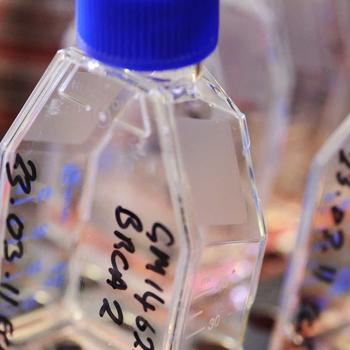
Dr Evgeny Makarov
Senior Lecturer
Heinz Wolff 113b
- Email: evgeny.makarov@brunel.ac.uk
- Tel: +44 (0)1895 268673
Research area(s)
Gene expression; RNA processing; precursor messenger RNA (pre-mRNA) splicing; exosomes; natural products as a source of anti-cancer agents.
Research Interests
My research interests are in the field of precursor messenger RNA (pre-mRNA) splicing. Pre-mRNA splicing is a cellular process in which non-coding sequences (introns) are removed and coding sequences (exons) are joined together to generate mRNA for protein production. Pre-mRNA splicing is somewhat similar to film editing: if it is not done properly, two unmatched scenes may be stitched together in one episode, which would not make sense. In splicing, if exon-intron boundaries (splice sites) are not correctly identified, the wrong mRNA will be produced. From this, a faulty protein will be synthesised and this may cause disease. To extend the analogy, a film scenario is dramatically changed by the selection of scenes; by the same token, in a living cell, pre-mRNA can be processed in different ways via the alternative use of different splice sites. This phenomenon is called alternative splicing and allows the production of several proteins from a single gene. I am currently focused on the study of disease-associated alternative splicing. The major ongoing project is on the study of the ageing-related pre-mRNA splicing of human LMNA gene, encoding lamin A and C proteins, and especially, its aberrant splicing that causes the premature ageing of Hutchinson Gilford Progeria Syndrome patients. The aim is to identify the proteins modulating the specific splicing outcomes which, in turn, are likely to affect the speed of the ageing process. In this respect, the pharmaceutical targeting of the proteins identified in the proposed research -- inhibition of their function by small interacting molecules -- may lead to the discovery of novel drugs capable of slowing the ageing process.
The other ongoing projects are: (i) The hTERT alternative splicing regulation as a potential cancer therapeutic modality; (ii) Exosomes as the delivery vehicles for therapeutic RNAs; (iii) Extracts from fruit soursop (Annona muricata) as a source of anti-cancer agents.
Research grants and projects
Research Projects
Project details
-
The Progeria Research Foundation Research Grant (2010/11)
-
The Royal Society Research Grant (2008/09)
-
The BRIEF (Brunel Research Initiative and Enterprise Fund) Award (2007/08)
Research links
Co-author network
- Prof Joanna Bridger
- Dr Ansar Pathan
- Dr David Tree
- Dr Anthony Tsolaki
- Dr Rhona Anderson
- Dr Denise Ragusa
- Dr Matthew Themis
- Dr Predrag Slijepcevic
- Dr Sabrina Tosi
- Prof Michael Themis
- Visualise network
Similar research interests
- Professor David Harrison
- Dr Cathy Gower
- Professor Amanda Harvey
- Dr Oliver Gibson
- Professor Tatiana Kalganova
Research group(s)
- IEHS

